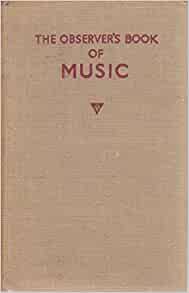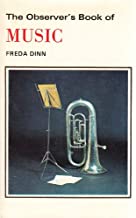When I was about eight or nine someone gave me The Observer’s Book of Music as a birthday or Christmas present. I was already learning to play the violin and keen on the (mostly classical) pieces I was hearing at school, on Derek McCulloch’s Saturday morning Children’s Favourites or on the newly acquired family radiogram. I read this neat little book a lot and can remember its contents very clearly – the beginning of my wider musical education, I suppose.
Acquiring Observer’s books was quite a thing for 1950s children and when I married Nicholas Elkin in 1969 we merged our collections and discarded the duplications. He didn’t have the music one so we kept mine, first published in 1953.
Something made me think of all this recently and I went to the shelf where smallest books live to refer to The Observer’s Book of Music in connection with an article I was writing. It was missing. What? Both the middle aged men who used to be my small boys deny all knowledge of it. Did someone else borrow it? Perhaps it got lost in the move “home” to London in 2016?
Just before Christmas I was strolling round Ely market with my elder son, Lucas, and his wife when he spotted a pile of Observer’s books on a stall. He picked out the music one and said “Look – that’s what you want”. So I bought it for £6 which made me chuckle since the original 1950s price was 5/- or 25p.
And, golly, how I’ve enjoyed the nostalgic revisit. It packs in a deal of information but is never patronising. I struggle, even now, to understand the opening section “Sound and how we hear it” which is pure physics but, as ever, I really like the detailed account of musical instruments and how they work. There’s a drawing of Beethoven’s pianoforte, an account of the evolution of the cornet, a wonderful drawing of a Russian bassoon along with details about stringed instruments and not, obviously, just the four you find in a standard symphony orchestra. For such a small book, the amount of information Freda Dinn packs in is extraordinary.

She’s good on terms in common use too. I think this was probably where I first read, for example, that scherzo is the Italian for joke so it usually denotes a jokey sort of movement in a symphony and that andante means walking pace. The little pieces we were playing at primary school didn’t, in general, use these grown up terms much. Then of course, a year or two later when I started first French and then Latin at secondary school the linguistic links began to make sense.
The Observer’s Book of Music ends with biographical notes on composers from Albeniz (who?) to Wolf. I wonder what the criteria for inclusion were? Several contemporary composers are in: Britten, Arnold, Bax, Barber, Walton etc. Of course all the obvious greats are there: Beethoven, Tchaikovsky, Brahms, Purcell and the like but some of her choices (Cui and Palmgren, for instance) now seem a bit obscure. She includes Samuel Coleridge-Taylor and Ethel Smythe the former the only black entry and the latter the only woman – and this was why I grew up having heard of both of them although it took the world most of my lifetime to wake up to the fact that, of course, neither was unique, Paul Sharp provides a nice little pencil sketch of each composer.
Rediscovering this book was fun. I realise now that the whole of the Observer’s series comprised beginner’s guides. They were child friendly but not intended exclusively for children. Indeed, even now, anyone wanting to learn more about music – mostly but not entirely classical – could do a lot worse than start here. It’s widely available on second hand book websites.

Next week on Susan’s Bookshelves: Doctor Finlay’s Casebook by AJ Cronin